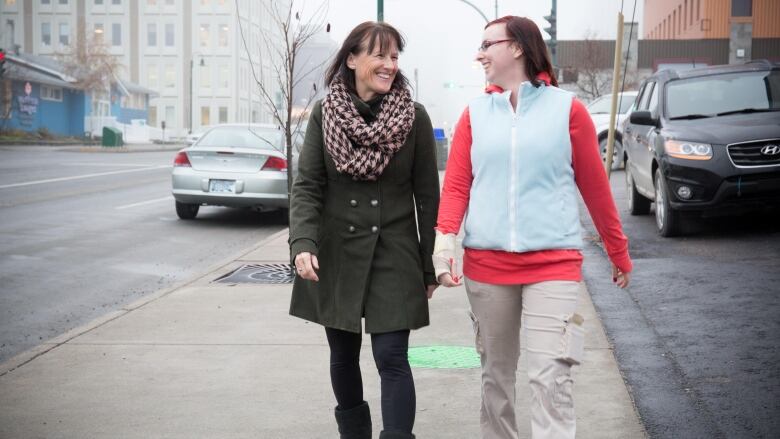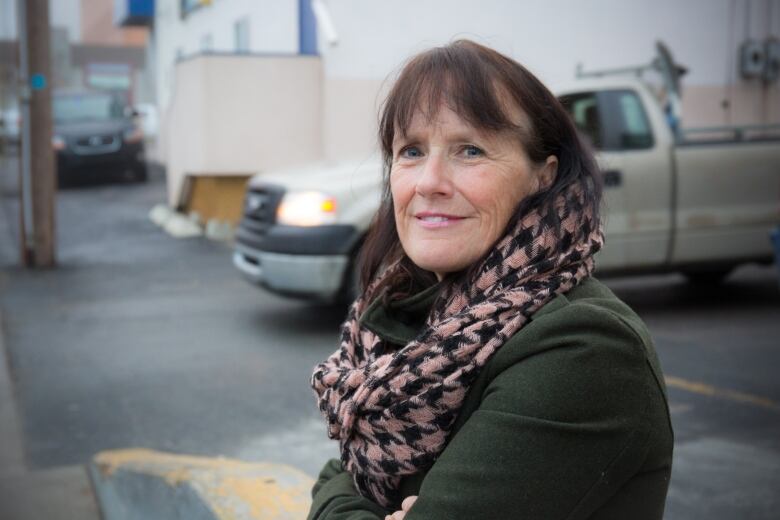Yellowknife social services takes a new approach to helping families
Yellowknifes 3 family preservation workers aim to keep children out of foster care

In a brightly-lit boardroom on the second floor of the offices of the Yellowknife Health and Social Services Authority, 25-year-old Dawn Blanchard is giving an update on the furniture she still needs to find for her new apartment.
Her conversation with NoeleneByrne sounds more like a visit with a favoured aunt than an interaction with a paid professional, but thats the whole idea.
Five months ago, Blanchard was homeless with a serious cocaine habit part of a downward spiral that she says began soon after her son was taken away. Now she's working part-time and preparing a home fortwo children under the age of eight.
"Do you still need to get beds for the boys?"Byrne asks.
"We still need to get beds for the boys,"Blanchard says.

The team's existence is one of the few bright spots in a scathing Auditor Generals report on the N.W.T.s Child and Family Servicesreleased earlier this year, which found the government isnt doing enough to protect the approximately 1,000 children who receive care each year.
The report also noted that one regional health authority employed a family preservation worker "who provides in-home parenting support to families who are assessed as being at potential risk."

She says in-home support can be as easy as helping someone clean a stove "Sometimes people dont know that the element lifts up,"she says or taking a family for a day at the Yellowknife River.
Now part of a team of three, Berens works with two otherfamily preservation workers to runworkshops on parenting,nutrition and, soon, anger management.Theyve created a play group to help improve childrens mental health. On top of that, all three do regular home visits to clients, delivering food from Yellowknifes Food Rescue organization every Fridays as a way to check in on families.
The idea is to help families with everything from budgeting to bedtimes, in order to reduce conflict and stress, and ultimately, prevent the out-of-home placement of children.
Its a far cry from regular child protectionwork, which often centres around crisis management.
"No apprehensions,"Berens says. "No court documents. Its all people work and its nice. Sometimes maddening at times, but its nice."
Berens was once a foster child herself when she was young, alongside one of her sisters. For two or three weeks the girls were placed with a couple who read to them each night.
"I was amazed,"Berens says.
Today, Berens says that experience is the reason she and her sister are the only two out of 14 siblings who have houses littered with books.
"Whatever little things we might be doing might look like little things today,"she says. "But its big stuff."
'A different kind of relationship'
Theres no statistics, yet, to illustrate whether family preservation workers are making a difference, but Elske Canam, who manages the team, says theres no doubt that they are.
"A lot of our families dont have good role models of what parents can be,"Canam says, citing residential schools as just one of the reasons. "You may not have the knowledge, but you can easily learn it."
Now Canam's team is on the leading edge of a shift in child services in the N.W.T.
In response to the auditor general's findings, the territorialgovernment announced last month that it would move towarda softer approach in child protection, by instructing its child protection workers not to investigate parents right away, but instead to distinguish between cases of abuse and cases of neglect.
In cases of neglect the majority of child protection cases in the N.W.T. their job will be to offer support to help those families.
At the announcement last month, Andy Langford, director of N.W.T. Child and Family Services, said that would "change the tone" of the relationship between the child protection worker.
That's something the family preservation workers have already experienced.
"They know theres a different relationship with us,"says Rochelle Horvat, the third member of the team in Yellowknife. "Were kind of like the good cop in a lot of ways."

For Byrne and Blanchard, that relationship is an intimate one.
Since April, theyve been meeting two or three times a week, sometimes at Blanchards old apartment, which the pair spent hours cleaning and organizing. Other times on outings with Blanchards son to the dog pound or the local playgroup.
Byrne admits she worried sometimes frantically about Blanchard before she gave up her cocaine habit.
Blanchard is more blunt: "I love her," she says. "But shes a pain in my ass sometimes."
"You wouldve been proud of me today,"Blanchard tells Byrne. "He was throwing a fit and I was good! Before I would just scream at my kid. Today I actually used positive parenting skills."
Byrne is proud, and pleased that she has an opportunity to work with children and their parents in a way that could have lifelong impacts.
"Theres a movement for this,"Bryne says. "Lets not wait until theres a crisis. Lets help these families and offer that support."
Corrections
- The original version of this story incorrectly identified which son was taken out of Blanchard's care. Changes have also been made to more accurately reflect the family's current living arrangements.Dec 04, 2014 8:31 AM CT












_(720p).jpg)


 OFFICIAL HD MUSIC VIDEO.jpg)
.jpg)



























































































